C. Lee McKenzie's Blog, page 93
March 17, 2011
Friday on Thursday
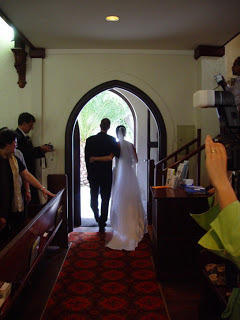 I know. I know. It's only Thursday, but I've got to get a jump on this week, just a bit. So I'm posting one day early. Shoot me.
I know. I know. It's only Thursday, but I've got to get a jump on this week, just a bit. So I'm posting one day early. Shoot me.I loved this quote today: "Everyone is a millionaire when it comes to promises." Ovid said that waaay back before any of us started making and breaking promises. I wonder how that sounded in Latin? Anybody?
Confession: Here are some promises I've broken.
I promised to accept everybody as they are and not make any judgements. (How hard is that to do?)
I promised to write on my new WIP everyday. (Well, life happened a few times, several times, a lot of times.)
I promised to blog four days a week. (Nawt! Is nawt out of style yet?)
I promised to see all of my friends at least once a month. (Ha!)
I promised not to be jealous, no matter what, no matter why. (Unrealistic, really! In my favor: the jealous moment passes quickly. Against me: I'm jealous a lot of moments.)
I promised to clean the refrigerator. (This promise doesn't count. I had a fever when I made it.)
 So any promises you'd care to share along with the excuses for breaking them? Come on. I promise not to tell.
So any promises you'd care to share along with the excuses for breaking them? Come on. I promise not to tell.Oh, and here's one promise I will keep. Take a look at Sharp Pen Dull Sword for some good news and some "freaking great prizes." But promise me you won't enter and win because I want to, okay? Thanks. I know I can count on you.
Sliding on the Edge, C. Lee McKenzie, WestSide Books, Spring '09
Published on March 17, 2011 12:18
March 14, 2011
Monday Miscellany
 I'm heartbroken. Crow Toes Quarterly is shutting down and its wonderful editor, Christopher Millin, is returning to his other passion, writing. I loved his publication and I appreciated being pubbed by him two times. His splendid, "playfully dark" collection of poetry and stories will be missed.
I'm heartbroken. Crow Toes Quarterly is shutting down and its wonderful editor, Christopher Millin, is returning to his other passion, writing. I loved his publication and I appreciated being pubbed by him two times. His splendid, "playfully dark" collection of poetry and stories will be missed.For those of you caught up in the book promotion frenzy, here's a great post by Arthur Slade about ads that work and how. Take a look.
 In this month's Writer Magazine, Susan Shapiro offers up 20 tips for selling your first book. The article is on pp 30-32, but here's a list of some of those tips (condensed).
In this month's Writer Magazine, Susan Shapiro offers up 20 tips for selling your first book. The article is on pp 30-32, but here's a list of some of those tips (condensed).Ask why you want to write the story. Inspire others? Legacy to kids?
Don't expect to make the big bucks out of the gate. Be realistic.
Just write the thing, for heaven sakes. The more pages you get down the better your chances at selling it.
Read the exact kind of books you want to publish.
Write what you're passionate about.
Frame your book for the sale: a clever title, 2-5 lines that sum up your book. This is for when you trap an agent in an elevator.
Ask for blurbs BEFORE you sell.
My favorite: "Plumbers don't get plumber's block." In other words make writing your priority.
Get criticized and good.
Her stragegy: Switch to non-fiction if your fiction ain't cutting it.
Build your platform: blog, TV, radio. Get known.

Daylight Saving Time:
45% of American adults say daylight saving time is not worth the hassle. 40% say it is. 27% say they've arrived somewhere early or late because of it. Rasmussen Reports. I love daylight saving time. Wish they never turned the clocks back.
Sliding on the Edge, C. Lee McKenzie, WestSide Books, Spring '09
Published on March 14, 2011 08:08
March 11, 2011
It's Friday . . . or What Happened to the Week?
 It's been one fast-paced week. I no sooner posted on my blog on Monday than Friday rolled right over my back. I've got the tracks to prove it.
It's been one fast-paced week. I no sooner posted on my blog on Monday than Friday rolled right over my back. I've got the tracks to prove it.What happens when you say yes too many times and suddenly you have to follow through with your promises or look like a flake?
Here's my latest strategy:
 Get up at 4 AM; fall face down into bed at 11PM. I look a lot like this guy when I do that.
Get up at 4 AM; fall face down into bed at 11PM. I look a lot like this guy when I do that.Make a list with High to Low priorities--lose list.

Drink lots of caffeine . . . much more than my body is used to.
Buy food in the deli or "arrange" to be near a restaurant when my husband's hungry.
Only Tweet in the mornings.
Put flowers on my desk to make me think I'm outside.

Wear the same clothes three days in a row; no fumbling in closet time and nobody will see me if I stay at my desk.
Buy an automatic feeder for the cats and promise them I'll brush them next month.
Let my answering machine do what it was designed to do.
Avoid mirrors, so I won't know how terrible my hair looks.

Leave a note in the kitchen, "Fend for yourselves."
Promise myself not to say yes to any new projects.
What did I miss?
Sliding on the Edge, C. Lee McKenzie, WestSide Books, Spring '09
Published on March 11, 2011 16:06
March 7, 2011
Monday Miscellany

Quote for Monday: "Be yourself; everyone else is already taken." Oscar Wilde.

Has anyone read Neesha Meminger's latest book, Jazz in Love ? I'm reading it now and loving it. Are you reading something that keeps you turning the pages? Please share. I'm getting a summer list started.

How good is your grammar on Monday? How can you fix these?
1. While waiting at the airport, it began to rain.
2. Although he'd committed illegal crimes, the gang boss was acquitted.
Does anyone have a suggestion for a resource on, How to Write a Short Story? It seems I have to come up something soon and my experience with writing this story form is close to nil.
Hope your Monday was special!
Sliding on the Edge, C. Lee McKenzie, WestSide Books, Spring '09
Published on March 07, 2011 16:25
March 2, 2011
Three Cat Day
 Even with the daffodils in full bloom and the fruit trees in blossom, it's a cold March. I can always tell just how cold by how many cats I find in the bed. At two in the afternoon there were two.
Even with the daffodils in full bloom and the fruit trees in blossom, it's a cold March. I can always tell just how cold by how many cats I find in the bed. At two in the afternoon there were two.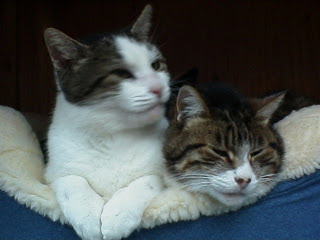
By four, there were three--you have look into the back where my black and cuddly Champ has managed to squeeze behind Al and Fritz. Mind you, this is a one-cat bed, but try to tell it to these guys.
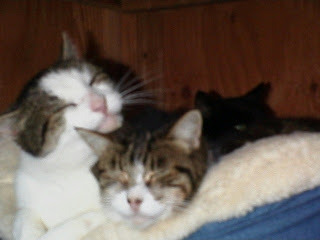 I think poetry is in order for this March day in California.
I think poetry is in order for this March day in California.Daffodil sunlightJust one glimpse and the day with all its chill grows warm. Three cats Once lonely, left to find their ways or notNow a family, willing and sharing and dreaming of daffodil sunlight.Maybe catnip.
Sliding on the Edge, C. Lee McKenzie, WestSide Books, Spring '09
Published on March 02, 2011 10:55
February 28, 2011
New Zealand Earthquake Relief Effort

Margot Kinberg over at Confessions of a Mystery Novelist is Doing the Write Thing. And it's a great idea.
Margot's putting together a charity raffle to help out the Christchurch, New Zealand earthquake relief efforts. She's looking for authors who are willing to donate signed copies of their books to support the cause. In her words...
If you are an author who'd like to donate a signed copy of one of your books, please email me at MargotKinberg(at)gmail(dot)com) and let me know that you'd like to be a part of Do the Write Thing and which title you'd like to contribute. Your donation will be greatly appreciated!! If you've already been in touch, thank you! I truly appreciate it.
Margot says ...
Once the list of authors and titles is final, I'll announce the "book packages." You'll then have the opportunity to win one of them. How do you get into the raffle? All we'll ask is that you make a donation to the New Zealand Red Cross. Once you do that, you'll be entered into the raffle, and you will have a chance to win a "book package" of terrific reads by very talented authors.
I've already emailed her and offered to donate a copy of Sliding on the Edge. If you can help, please contact her ASAP. Thanks.
Sliding on the Edge, C. Lee McKenzie, WestSide Books, Spring '09
Published on February 28, 2011 17:48
February 26, 2011
If it Smells Like a Cliché, It is a Cliché. Try Something Different: First Lines lll
The first two posts on First Lines were about Tone and Gimmicks. This one is about that all too horrible animal--the cliché and how you might avoid starting without one.

Of course, "It was a dark and stormy night;" is the first one that comes to mind, but what are some others? Here are a couple that agents and editors see a lot.
"At first morning's light she opened her eyes and . . ."
"We would arrive at the new house in only minutes and . . . "
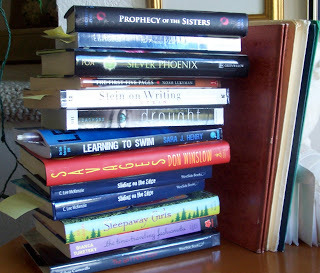 Now, not all cliches in writing are bad; they convey images and information quickly and concisely, and sometimes they are great at characterization; however, unless you're trying to reveal a character, unless the idea of cliche is central to your story, unless there is absolutely no other way to say what you want, I'd not start with one. Well, I wouldn't these days, but that's because I have in the past and had my hand slapped.
Now, not all cliches in writing are bad; they convey images and information quickly and concisely, and sometimes they are great at characterization; however, unless you're trying to reveal a character, unless the idea of cliche is central to your story, unless there is absolutely no other way to say what you want, I'd not start with one. Well, I wouldn't these days, but that's because I have in the past and had my hand slapped.
So how can you avoid cliches in a world where everyone and his pet hamster are writing and publishing--where social media sends ideas around the world instantly, so that what was fresh and exciting in the morning is stale and . . . clichéd by noon?
Here are some ideas I've pulled together from other writers and people who have real talent in this business of writing and knowing what's good.
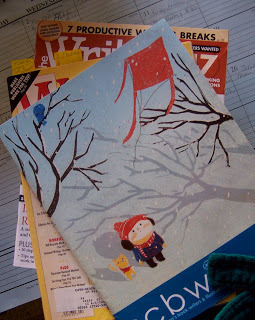
Start writing where you feel a spark. Do you really have a character firmly in your head, in your heart? Then write about that character: describe him, let him talk the way you hear his voice, put him into a place that he fits.
Skip writing that first sentence and write the second or the third. Hey, go for broke (cliche alert) and write the second paragraph. Then promise yourself you'll go back later and write the first one. Guess what? You may not have to. You may have already written it.
Pick the most exciting, the most vivid scene in your book. Write that scene. The heck with the opening line. You can always do that later, right?
So, let's say you really write dialog like a New York Times best seller writes it. Don't. Instead, force yourself to start your book with description or narration--something you're not as good at writing. Re-writing is always an option, so you can always go back and do that opening dialog . . . or not.
Do you have some techniques that help you get those first lines just right? Care to share?:
Sliding on the Edge, C. Lee McKenzie, WestSide Books, Spring '09

Of course, "It was a dark and stormy night;" is the first one that comes to mind, but what are some others? Here are a couple that agents and editors see a lot.
"At first morning's light she opened her eyes and . . ."
"We would arrive at the new house in only minutes and . . . "
 Now, not all cliches in writing are bad; they convey images and information quickly and concisely, and sometimes they are great at characterization; however, unless you're trying to reveal a character, unless the idea of cliche is central to your story, unless there is absolutely no other way to say what you want, I'd not start with one. Well, I wouldn't these days, but that's because I have in the past and had my hand slapped.
Now, not all cliches in writing are bad; they convey images and information quickly and concisely, and sometimes they are great at characterization; however, unless you're trying to reveal a character, unless the idea of cliche is central to your story, unless there is absolutely no other way to say what you want, I'd not start with one. Well, I wouldn't these days, but that's because I have in the past and had my hand slapped.So how can you avoid cliches in a world where everyone and his pet hamster are writing and publishing--where social media sends ideas around the world instantly, so that what was fresh and exciting in the morning is stale and . . . clichéd by noon?
Here are some ideas I've pulled together from other writers and people who have real talent in this business of writing and knowing what's good.

Start writing where you feel a spark. Do you really have a character firmly in your head, in your heart? Then write about that character: describe him, let him talk the way you hear his voice, put him into a place that he fits.
Skip writing that first sentence and write the second or the third. Hey, go for broke (cliche alert) and write the second paragraph. Then promise yourself you'll go back later and write the first one. Guess what? You may not have to. You may have already written it.
Pick the most exciting, the most vivid scene in your book. Write that scene. The heck with the opening line. You can always do that later, right?
So, let's say you really write dialog like a New York Times best seller writes it. Don't. Instead, force yourself to start your book with description or narration--something you're not as good at writing. Re-writing is always an option, so you can always go back and do that opening dialog . . . or not.
Do you have some techniques that help you get those first lines just right? Care to share?:
Sliding on the Edge, C. Lee McKenzie, WestSide Books, Spring '09
Published on February 26, 2011 09:49
February 23, 2011
Goodbye, Lisa . . . with love.

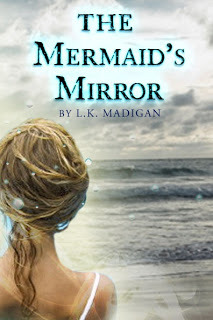 The Write Game is closed for the rest of the week. I'm taking some time off to get used to the world without LK Madigan--a super writer and a good friend.
The Write Game is closed for the rest of the week. I'm taking some time off to get used to the world without LK Madigan--a super writer and a good friend.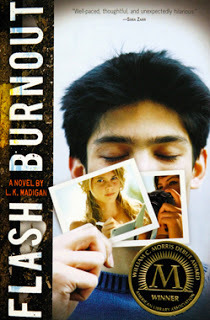
Sliding on the Edge, C. Lee McKenzie, WestSide Books, Spring '09
Published on February 23, 2011 16:46
February 21, 2011
Those Gimmicky First Lines: Ax 'em!
 Last week I said I delete a first line if I don't think it sets the tone for my book, and I promised to discuss the other reasons I delete first lines. The gimmicky line definitely gets the ax in my stories. What's a gimmicky line? It's something that catches the eye, shocks with its intensity, promises something that the author fails to deliver in the following paragraph or the rest of the book.
Last week I said I delete a first line if I don't think it sets the tone for my book, and I promised to discuss the other reasons I delete first lines. The gimmicky line definitely gets the ax in my stories. What's a gimmicky line? It's something that catches the eye, shocks with its intensity, promises something that the author fails to deliver in the following paragraph or the rest of the book. Here's an example:
Marge stood at the edge of the canyon, ready to end her life on the count of three. Last year she'd had nothing but wonderful adventures ahead of her--glamorous parties, trips to any place in the world. Her mom and she lived together then, and her mom didn't approve of that kind of lifestyle. She always shook her head when Marge came down the stairs dressed for an evening out or a trip to Paris. What did her dowdy mother know? Nothing. Neither did her dad. He never did much except read the sports pages.
 Huh? Just look at the poor reader who thought she was getting into something really exciting. She was promised this count of three, a girl hurling herself off the cliff to sure death, and then suddenly she's back to a year before, discussing Mom and Dad. Maybe this backstory can come later, but not now, not on this first page. On the first page the writer has to maintain the intensity she's established with that opening line.
Huh? Just look at the poor reader who thought she was getting into something really exciting. She was promised this count of three, a girl hurling herself off the cliff to sure death, and then suddenly she's back to a year before, discussing Mom and Dad. Maybe this backstory can come later, but not now, not on this first page. On the first page the writer has to maintain the intensity she's established with that opening line.It took a while for me to decide what was gimmicky rather than intense, interesting and fresh. So here's what I came up with to test the openings I write. I ask myself these questions:
1) What does that line do to start developing the character?
2) What does it do to show the reader something about the narrator?
3) How about the setting? Does it take the reader where my story will happen?
4) Does it help to establish the tone of my story?
5) And, of course, does the paragraph that follows sustain my first line? How about the rest of the page? The chapter?
One line can't do all of these things, but I think it should do at least one and do it well. Note that the categories are for discussion and convenience and not always clear-cut, especially when the writer is skilled and can pack a lot into a few words. One thing that I really like to accomplish is to reveal any of these four story elements and jolt the reader at the same time with the unexpected, the tantalizing, the bizarre.
Okay, so I want something that will keep eyes on my writing, that will get the reader to move on to my first paragraph (where, of course, I still must shine as a writer), and then to the bottom of that first page where I'll make them turn to page two with a brilliant "what's next" sentence. So, you see what I'm saying? The first line is very important, but you can't hang everything on it even when it's the most fabulous first line ever written.
Here are a few first lines I admire. I've tried to separate them out according to the categories I use--again for discussion and convenience. And you'll notice I don't stick with YA and MG; I don't stick with the most recent books either.
Character:
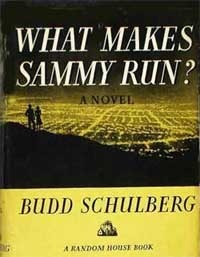 "The first time I saw him he couldn't have been more than sixteen years old a little ferret of a kid, sharp and quick." Schulberg, What Makes Sammy Run?
"The first time I saw him he couldn't have been more than sixteen years old a little ferret of a kid, sharp and quick." Schulberg, What Makes Sammy Run?"The first thing I did was steal a body." Lester, Bedeviled
"I planned my death carefully; unlike my life, which meandered along from one thing to another despite my feeble attempts to control it." Atwood, Lady Oracle
Narrator:
"If I'd blinked, I would have missed it." Henry, Learning to Swim
[image error] "She saw a beach made of ice, and she felt her heart breaking." Lo, Huntress
Setting:
"When he woke in the woods in the dark and the cold of the night he'd reached out to touch the child sleeping beside him." McCarthy, The Road
"On rainy days, we don't have to work in the woods, gathering water until our backs ache and our fingers tremble around out spoons." Bachorz, Drought
"Ten minutes before it happened, four-year-old Laurie Kenyon was sitting cross-legged on the floor of the den rearranging the furniture in her dollhouse." Clark, All Around the Town
Sliding on the Edge, C. Lee McKenzie, WestSide Books, Spring '09
Published on February 21, 2011 10:57
February 16, 2011
Rejection or Learning From Those First Line Mistakes-l
 If any of you authors visiting here today has never been rejected, stop reading now and go something useful, like wash the dishes or vacuum the car. But if you have suffered that heart-stinging, stomach-wrenching, "Thank you for considering us for your manuscript. Unfortunately, blah-blah-blah," then read on.
If any of you authors visiting here today has never been rejected, stop reading now and go something useful, like wash the dishes or vacuum the car. But if you have suffered that heart-stinging, stomach-wrenching, "Thank you for considering us for your manuscript. Unfortunately, blah-blah-blah," then read on.I've been very fortunate to find an editor who likes what I write and who is patient enough to read through my manuscripts, then offer suggestions that will shape them into publishable pieces. But getting to this point has been the most difficult job I've ever tackled and that includes trying to land a Marlin a few years back.
There are many good statements, chapters, books about how to become a published author (and, for now, I'm not including self-publishing as an option and sticking with the traditional route). When I boiled down most of this advice, I came up with a rule for myself.
After three rejections of the same manuscript, I take a hard look at those opening lines to see if I can find out what's wrong--why agents and editors aren't asking me to read more of my "brilliant" work. What I've decided is that ten to one the problem is in those first lines, that first paragraph, those first 1 to 3 chapters.
I start by deleting that first line when:
it doesn't sufficiently set the tone for my book.
it's more gimmicky than intense, interesting, fresh.it has anything that even smells like a cliche.it's standoffish from what follows next.it's overblown for what follows next.
In this post I'll deal with tone.
So what is tone? It's your voice that should start at the beginning and continue all the way through your book. Do you want your book to be humorous? How about intimate? Scary? Here are some examples of what I think are strong opening lines to books that sustain the tone these lines establish immediately.
 "Today I moved to a twelve-acre rock covered with cement, topped with bird turd and surrounded by water." Choldenko, Al Capone Does My Shirts
"Today I moved to a twelve-acre rock covered with cement, topped with bird turd and surrounded by water." Choldenko, Al Capone Does My ShirtsIt's her word choice, her pov and the sentence structure that plunks the reader on Alcatraz as seen from her kid's eyes. If you've read her story, you know that's exactly the tone through out--youthful, a touch sarcastic, but with a heap of charm.
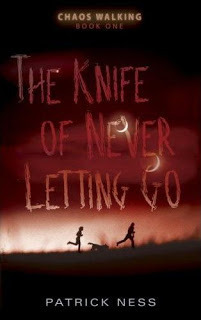 "The first thing you find out when yer dog learns to talk is that dogs don't got nothing much to say." Ness, The Knife of Never Letting Go
"The first thing you find out when yer dog learns to talk is that dogs don't got nothing much to say." Ness, The Knife of Never Letting GoNotice, "yer" and "don't got nothing." Ness has set up the language and the sarcastic tone for his MC, then he lures us into a futuristic world immediately, a one where dogs learn to talk. One line, folks. One perfect line.
Next post I'll be dealing with gimmicky first lines and why they just don't work--IMHMO. Want to share other notable first lines that set the tone and make you read on? How about sharing one of your own? You've labored over it, maybe someone will learn from what you've created or be able to offer a suggestion that will catch that next agent's or editor's eye. Sliding on the Edge, C. Lee McKenzie, WestSide Books, Spring '09
Published on February 16, 2011 12:22



